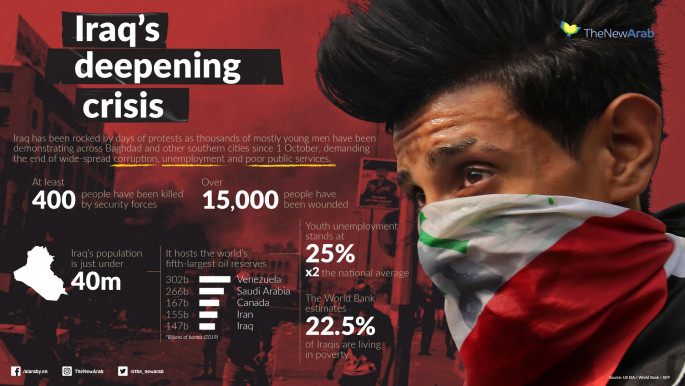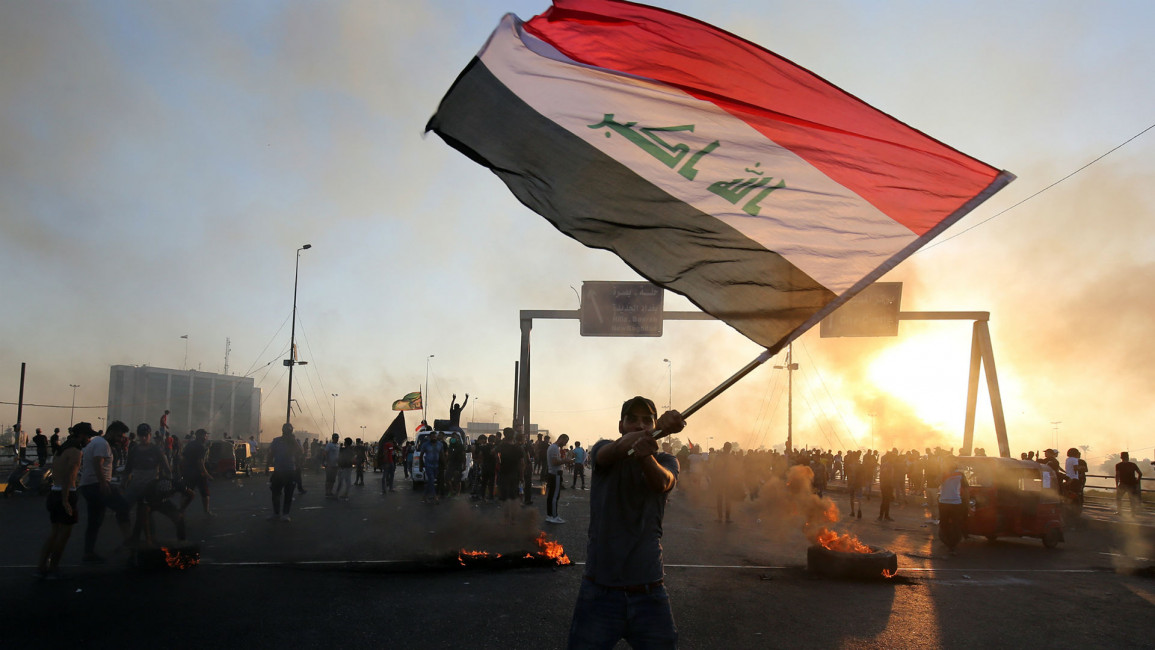Iraq security forces clear protest camps following Sadr's U-turn
Iraqi security forces cleared anti-government protesters from streets and squares in Baghdad and the south on Saturday, AFP journalists reported, stoking protester fears their long-running campaign risks being sidelined as hundreds of thousands rallied against "American occupiers" in Baghdad.
It came a day after populist politician Moqtada Sadr organised his own mass rally demanding US troops leave Iraq before announcing that he would no longer back the separate youth-dominated protest movement demanding sweeping reform.
Within hours, security forces had stormed a protest camp in the southern port city of Basra, forcibly dispersing activists, an AFP correspondent reported.
Their tents were burned down and municipal staff could be seen clearing the charred remains to reopen the square.
Many demonstrators were seen taking down tents in the cities of Hilla, Diwaniyah, Kut and Amarah.
In the capital, security forces cleared sit-ins from Tayaran Square, Mohammad Qasim highway and Ahrar Bridge, according to Baghdad military command.
A medical source told AFP six protesters had been wounded.
Demonstrators had blocked off Tayaran Square and the Mohammad Qasim highway in east Baghdad since Monday in an attempt to pressure the government to enact long-awaited reforms.
Comment: US and Iran should stop holding Iraq's political sovereignty hostage
Ahrar Bridge, which links east Baghdad to western districts that are home to government buildings and embassies, had been partly occupied by protestors in recent months.
Protesters in Baghdad's Tahrir (Liberation) Square, the main rallying point for the protesters, told AFP they heard live rounds and saw smoke bombs on Saturday as police sought to pin them back.
The security forces did not storm the square and a police source told AFP there was no plan to do so yet.
The protesters had long feared that if Sadr withdrew his support, they would lose political cover.
Twitter Post
|
Sadr, a militiaman-turned-cleric, is notorious for switching political positions with dizzying speed.
He backed the protests from soon after they erupted in October and called on the government to resign - even though he controls parliament's largest bloc and top ministerial posts.
On Friday, hundreds of thousands of his supporters gathered in Baghdad after he called for a rally to demand the departure of the 5,200 US troops in Iraq, after a US drone strike in Baghdad killed top Iraqi and Iranian commanders this month.
Sadr himself did not attend, but tweeted late on Friday to hail the massive turnout and say he would no longer be involved in the protesters' campaign for reform.
A representative of Sadr took to the stage at the protest site and read out a statement by the influential Shia cleric and populist politician.
It called for all foreign forces to leave Iraq, the cancellation of Iraq's security agreements with the US, the closure of Iraqi airspace to American military and surveillance aircraft and for US President Donald Trump not to be "arrogant" when addressing Iraqi officials.
"If all this is implemented, we will deal with it as a non-occupying country - otherwise it will be considered a country hostile to Iraq," the statement said.
Protesters then began peeling away from the square, tossing their signs in bins along the way, but thousands lingered in the rally camp.
Journalists reported the rally came to a "quiet close" after Sadr's statement.
The American military presence has been a fiercely contested issue in Iraq since a US drone strike killed Iranian general Qasem Soleimani and Iraqi paramilitary leader Abu Mahdi al-Muhandis outside Baghdad airport on 3 January.
Two days later, parliament voted for all foreign troops, including some 5,200 US personnel, to leave the country.
The vote was non-binding and the US special envoy for the coalition against the Islamic State group, James Jeffrey, said Thursday there was no "real engagement" between the two governments on the issue.
Comment: US military should take the Iraqi parliament's advice and leave
Joint US-Iraqi operations against IS have been on hold since the drone attack, which triggered retaliatory Iranian missile strikes against US troops in Iraq.
No Iraqi or US personnel were killed in Iran's strike.
Sadr hedges bets
Sadr, 46, battled US forces at the head of his Mahdi Army militia after the US-led invasion toppled Saddam Hussein in 2003.
He later branded himself a reformist and backed the recent anti-government protests when they erupted in October.
The cleric controls parliament's largest bloc and his followers hold top ministerial
His spokesman Saleh al-Obeidy hinted that while others in Iraq unequivocally blamed either the US or Iran for instability, Sadr would choose a middle path.
"We believe that both are behind this ruin, and Sadr is trying to balance between the two," he said.
Harith Hasan of the Carnegie Middle East Center said Sadr was trying to sustain his "multiple identities" by backing various protests.
"On the one hand, (he seeks to) position himself as the leader of a reform movement, as a populist, as anti-establishment," Hasan told AFP.
"On the other hand, he also wants to sustain his image as the leader of the resistance to the 'American occupation'," partly to win favour with Iran.
Sadr may also have domestic motivations, Hasan said.
"This protest will show Sadr is still the one able to mobilise large groups of people in the streets - but it's also possible he wants other groups to respond by giving him more space to choose the prime minister."



